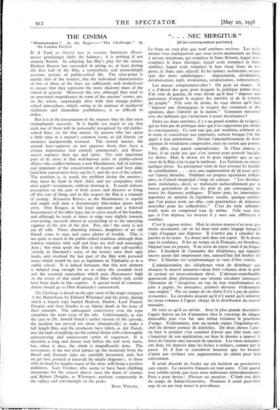THE CINEMA
" Housemaster." At the Regal—" The Challenge." At the London Pavilion
IF A Yank at Oxford was in essence American, House- master gratifyingly shifts the balance ; it is nothing if not entirely British. In adapting Ian Hay's play for the screen, Herbert Brenon has succeeded in giving us, at least during the first half of the film, a sympathetic and astonishingly accurate picture of public-school life. The view-point is mainly that of the masters, but the individual characteristics of two or three of the boys are sufficiently well worked-out to ensure that they represent the more shadowy mass of the school in general. Moreover the sets, although they tend to an unwonted magnificence in some of the masters' rooms, are, on the whole, surprisingly alive with that strange public- school atmosphere, which, owing to its mixture of mediaeval traditions and immediate youthfulness, is so difficult to define.
But it is in the presentation of the masters that the film most triumphantly succeeds. It is hardly too much to say that each one of them will be personally recognised by old public- school boys, or, for that matter, by anyone who has spent a little time in a master's common room, as old friends (or enemies) unexpectedly restored. The eternal master, the eternal boy—approve or not approve them, they have a certain importance (not entirely sentimental), and House- master captures their age and spirit. The only important part of its story is that well-known crisis in public-school affairs—the conflict between a new Headmaster, full of reforms and impatient of the conservatism of masters and boys alike (and how conservative boys can be !), and the rest of the school. '['he problem is, as usual, the problem facing the masters ; they must be loyal to their chief, and yet sympathise with their pupils' resentment, without showing it. It needs delicate perception on the part of both actors and director to bring off this sort of thing, and in this respect the film is a triumph of casting. Kynaston Reeves, as the Headmaster, is superb and might well turn a documentary film-maker green with envy. Otto Kruger, as his loyal opponent and a beloved housemaster of the older type, has to carry much of the burden, and although he tends at times to edge very slightly towards over-acting, succeeds almost in reconciling us to the annoying vagaries of the rest of the plot. For, alas ! the story is not yet all told. Three charming minxes, daughters of an old friend, come to stay, and cause plenty of trouble. This is not quite so much in the public-school tradition, although their tomboy relations with staff and boys are well and amusingly done ; but what spoils the film is that love and self-sacrifice ',strictly in film-land's sense of the words) raise their ugly heads, and overload the last part of the film with personal issues which would be just as legitimate in Timbuktu as in a public school. It is indeed fortunate that this new element is delayed long enough for us to enjoy the essential story and the essential atmosphere which puts Housemaster high on the roster of that small group of films which only could have been made in this country. A special word of commen- dation should go to Otto Kanturek's camerawork.
The Challenge is based on the epic story of the tragic conquest A the Matterhorn by Edward Whymper and his party, during which a frayed rope hurled Hudson, Hadow, Lord Francis Douglas and their Guides to an Alpine death in the hour of their triumph. The subsequent controversy over the rope completes the main issue of the tale. Unfortunately, as was the case in Dr. Arnold Fanck's earlier version of the episode, the incident has proved too short (dramatically) to make a full length film, and the producers have fallen, as did Fanck, into the fault of padding out the central theme with a thoroughly uninteresting and unnecessary series of sequences. It is therefore a long and dreary wait before the real story starts, but, when it does, the climb is magnificently done. The movements of the two rival parties up the mountain from the Breuil and Zermatt sides are carefully presented, and, lest we get lost, pointed at intervals by simple diagrams ; to those with no head for heights many of the shots will bring a positive giddiness. Luis Trenker, who seems to have been climbing mountains for the camera almost since the dawn of cinema, and Robert Douglas, as Whymper, perform competently in the valleys and convincingly on the peaks.
BASIL WRIGHT.


















































 Previous page
Previous page